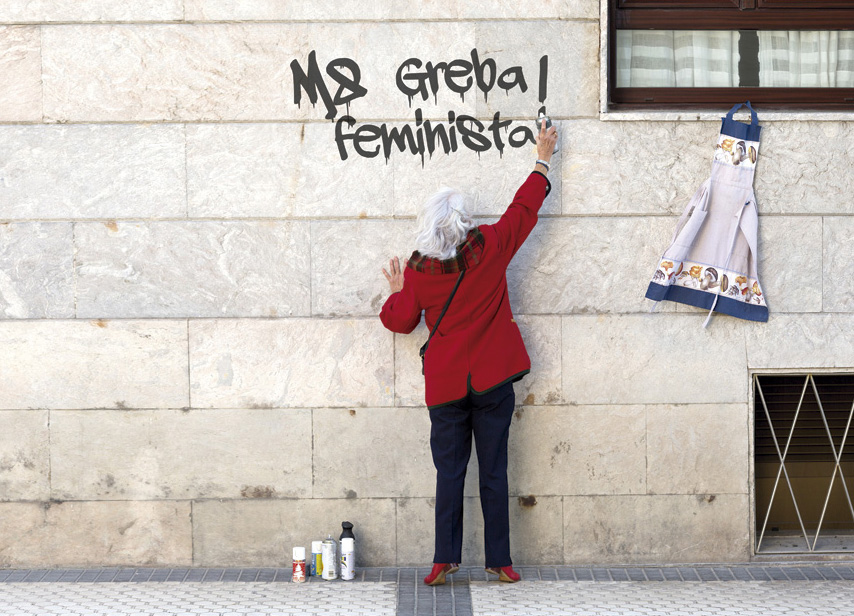Starting point for a long road
- This is a women's strike called by the feminist movement of the Basque Country. They looked right and left, looking for examples. Iceland (1975), Catalan Countries (2015), Poland (2016), while last year there was a strike in 70 countries... It is not an unemployment to protect employment, it is not a day to demand decent working conditions. Women will demand a dignified life and, in order to achieve this, they will transfer to the front line the fronts they have at work, in care, in studies, in leisure time and in the street.

“March 8 has always been a day linked to the labor movement and we want to delve into it: to be a woman and a worker in this oppression that crosses. The feminist strike is a strike; but in this case it is a strike that comes from a productive strike to a reproductive one.” They are words of Naia Torrealdai Mandaluniz, member of Bilgune Feminist of Bilbao and member of the 8M strike organization. What if women stayed? Are care valued in society? Are we aware of your need when we go to work or school well-dressed, well-fed and healthy? Who does this kind of work? In most cases, women, some paid and many (most) free.
The feminist movement has called on all women to come to the stops and actions to be carried out on 8 March, at the same time as they have called on those who cannot but underline the need for a strike that hangs the aprons of the window. The organizers are aware that many women who work in care and other precarious work will find it impossible to physically join the strike. Consequently, different ways of giving visibility and support have been sought, considering that the situation of each of the women is different. They say that this year’s feminist strike is the beginning of a long process, which unfortunately still remains many years of struggle, and the first step is to give visibility and value to the care tasks and the women who work in them.
We talk about the feminization of care and other things with Silvia Cony Haydee Rivas, member of the Munduko Emakumeak association. He is proud that the feminist strike denounces aloud and firmly the precariousness of care tasks. It has stressed the importance of holding vigilance strikes as an effective means of denouncing and making the situation visible, of putting pressure on society and institutions, among other things. It has also ensured that housekeepers who carry out surveillance work are working both in the long and deep process of becoming aware of their situation. First, “if we do not own our rights, fear and pressure prevail. Most of the women who work in homes as streetlights are migrants, many of them are undocumented and, as they are not entitled to their rights, they are terrified. How will they join the strike if many do not have a break?” In addition to the stops, he has highlighted the importance of ideas such as hanging the mandil or wearing a purple cuff, even if symbolically, because making the care work visible is essential to sensitize society and begin to change the situation.
Care is privatized work that is done many times at home, which makes it difficult to know what happens. Often, in addition to the female caregiver and the elderly, no one knows the situation. These women who come from abroad to work, besides sustaining their lives in the Basque Country, have to maintain their family in their own country and produce a triple pressure: that of their boss, that of their family, and that of themselves. They are the victims of exploitation, endless work activities, the need to work tirelessly, fear and loneliness, in a situation of extreme precariousness. Haydee Rivas of the World Women's Association has reviewed sexual abuse, violence, disease and xenophobia.
Silvia Cony Haydee Rivas, member of Munduko Emakumeak, is proud that the feminist strike loudly and firmly denounces the precariousness of care.
Haydee Rivas attaches great importance to the fact that we homeworkers are packaged: “You will not go alone the first time to a demonstration where there are thousands of people, the support of your friends, colleagues and colleagues is necessary to dare and fight for your situation.” It considers that guaranteeing the collective in the strike and promoting diversity - race, body, country, etc. - is an essential premise. Although she has worked in a process of profound empowerment in recent years, she knows that many of the migrant and non-migrant women who work in care do not have knowledge of their rights and are therefore limited to carrying out arrests, claiming their rights, defending themselves in the network. It has called for the need to reach and protect these women in their process, although it is aware that it is a complicated and difficult task. Despite the harsh conditions faced by women, Haydee Rivas is proud that they are increasingly participating in associations, becoming entangled and asserting their rights and situation thanks to mutual support: “We are protagonists, more and more,” he says.
Haydee Rivas reminds men: “It is necessary, above all, that men realize that if it were not for care work, life could not thrive and that it must be shared among all.”
This 8 March, different
Asked about the differences of 8 March this year with respect to previous years, Leire Murguialday, a member of the Feminist Assembly of Donostia, speaks of: “Last year there were also some stoppages, but this year we have already launched a process and that is most important, the same process that we are working on organising the feminist strike. So far, March 8 has been a holiday and this year we want to make it clear that in addition to being a meeting point for women, it is also a day of struggle.” They have been organized in a decentralized way for the strike of Hego Euskal Herria. In recent months, open and participatory assemblies have been held in towns and cities, and according to the possibilities and forces of each place the organization of the strike day has been carried out, the activities will also be different. The feminist movement of Euskal Herria has considered it essential to take into account the idiosyncrasies of each region, and therefore, with the same objective, they drive action and autonomous organization, so that there is general coordination with a working group that channels the national network. However, the proposal is the same for two moments of the day: At 12:00 activities and afternoon demonstration.
Murguialday has defined as “disobedient actions” that will be carried out here and there. Torrealdai adds: “This feminist strike differs from the usual strikes because it is not the unions that call the strike, but the feminist movements with the trade union alliance.”
Manifesto “Emakumeok* flat”
Under the motto Emakumeok* planto, the feminist movement of Euskal Herria has called for a strike in the fields of work, study, care and consumption. The manifesto states: “Last year, in more than 70 countries, women* launched an appeal for an international women’s strike* against a world that generates multiple forms of violence and inequality against women*. On March 8 of this year the feminist movement of Euskal Herria wants to join the Emakumeok claim*, to denounce the capitalist, racist and heteropatriarchal system that dominates and oppresses us. This day will be the starting point of a long road. In this way, let us build new alliances, uniting and knowing each other, rethinking our struggles, building new resistance and freeing ourselves from the world that marginalizes us, always with the goal of creating a feminist alternative”.
The organizers have placed an asterisk on the word "woman" and given the following explanation: “We will use the name of woman, thinking that in the feminist strike of March 8 it is valid for political articulation, although beyond the binary system of gender we are different bodies, trajectories, experiences, capacities and identities (chapels, trancas…)”.
Men in the M8
In the organizational assemblies they have not reflected on what the role of men should be on March 8, because they consider that it is a work of men and not of the feminist movement, and they have stressed that men have to be allies, that is, “the subjects are, they must understand that it is a strike of women, that they do not have to strike”.
12 tracks looking at M8
The Association of Men for Gender Equality (AHIGE), based in Spain, has given a number of advice to men. They have spread widely on social networks and we have brought the Basque version here. Below are the 12 recommendations:
- If you are a parent you take care of your sons and daughters and help both the discussion and the student strike (in the parent association, in the school...).
- If you're a friend, you can take care of your friends' children.
- If you are a partner, you can offer to extend the women's strike* in your workplace, support, perform minimal services or work with women* collaborators. You can use the day’s wage for the feminist movement or arrange a resistance box for the women’s strike* at work.
- If you are the head of the company, solidarity with the women who work in your company* and avoid retaliation, annoyance and problems.
- If you are a student, protect the unemployment of women* partners who are not going to school and students.
- If you're a teacher, don't pass the list on March 8. Remember, your students’ mistake is justified: they are on the street shouting “they are killing us” and shouting “we want to live”.
- If in your family, in the community group or in the affective environment there are those who need care, from that day on, start to worry about the work that women usually do*.
- If you have sex with a woman*, on March 8 you provide you with all the help you need to be on the street.
- Spread the message to all your friends and teams. If you're a militant, take yourself to your political space.
- Don't consume in the shops. Join the consumer strike.
- If you go to the mobilizations on March 8 (meaning that in previous situations there are no women* who need your support in your life), stand on the reverse, without giving an order, and without intent to correct the demonstration, with an attitude of support.
- Before and after the strike you can meet with other men to reflect together on masculinities, do personal and collective work, raise awareness of your privileges and take steps towards a society free from domination.
The goal is to change the whole model of society
The feminist movement is proposing a feminist strike that goes beyond all borders. The demands go beyond the world of work, it wants to rethink the concept of work and for this it bets on unemployment linked to the obligations of care and consumption. In the manifesto it says: “The labor and social conflict we are experiencing will never be solved unless we look at the reproductive field. We want to re-adapt the space occupied by women* in the street, at home, at work and in the intimate space. Our struggle crosses the labour, political, vital and economic spheres. This is not a defense strike. We will go out into the street with political proposals that will change the whole model!”
Feminist strike models at the international level

Iceland, 1975 90 per
cent of women went on
strike in 1975, in Reykjavi more than 25,000 women took to the streets. In the country as a whole, 90 per cent of women have followed the strike. Banks, schools, factories and shops had to close, that is, the country was paralysed. As a result, the men had to remain in the tasks of surveillance and custody of the housing.
This is the strike model that most closely approximates the objectives of the feminist movement of the Basque Country. Although much work remains to be done on a feminist strike of this kind, this is the first step, and after 8 March they will continue to work to “denounce the precariousness of women in different areas”.
On March 29, 2012,
the World March of Women of Euskal Herria called a strike on the balcony under the motto Amantalak,
emakumeok kalera, to denounce the precarious situation of the tasks of care and feminization of poverty. “We can say that it was the antecedent of the current feminist strike,” says Naia Torrealdai, one of the organizers of this year’s strike.

The Catalan Countries movement,
Vaga de totes 2015,
which is taking place in the Catalan Countries, Vaga de totes (The Strike of All), has been an example for the feminist movement of Euskal Herria. They have organized numerous conferences and activities in Euskal Herria and there is a close relationship between the movements.
Vaga de totes was held on May 19, 2015 in various cities, towns and neighborhoods of the town. Everyone’s strike aims to question the classic model of general strike and make a feminist critique of the work, making visible the reproductive works that women have historically done and which are the support of the current system and life.

Poland, 2016 In
the
European country for abortion rights, women were dressed in black and black flags were fanned. They stopped going to work and school and they called against the abortion bill that was on the way. The law would prohibit abortion.
After a month, the feminists will take to the streets the day of working women. We have an annual appointment that we have organised and prepared enthusiastically every year. Last week we looked back at the Portugalete Assembly, remembering the feminist strikes of 2018 and... [+]
Azken urteetan mobilizaziorako gaitasunari dagokionez nabarmendu den mugimendurik bada, feminista da horietako bat. Bi urtez segidan, greba tresnatzat, martxoaren 8 arrakastatsuak burutu ditu; kapitalaren logikari bizitzarena gainjartzea exijitzeko, milaka emakumek lan orori... [+]
On February 2, 2018, the kazkaba through the streets of Donostia-San Sebastián with a loud noise. The Euskal Herria Feminist Movement calls for a feminist strike on March 8. This was a recognition of the struggle of the cigarreros of Tabakalera: dozens of women*, witnesses of... [+]
In studying economics, I've never seen the concept of strike, even though the link between them is very straightforward. The reason is obvious: economic power defines what the economy is. In the strike of women the invisibility is double, because the analysis is done with the... [+]
Ikusi dugu lehenago. Ekologismoa da adibide paradigmatikoa. Halaber, pink washing-a edo gaypitalismoa. Merkatuak gure borrokak irentsi, digeritu eta gorotz moduan produktu kapitalista bat iraizten digu, salmentarako prest, sistemari funtzionala egiten zaiona.
Hedabideek... [+]























